
Boxing is a combat sport and martial art. Taking place in a boxing ring, it involves two people – usually wearing protective equipment, such as protective gloves, hand wraps, and mouthguards – throwing punches at each other for a predetermined amount of time.

Kickboxing is a full-contact hybrid martial art and boxing type based on punching and kicking. Kickboxing originated in the 1950s to 1970s. The fight takes place in a boxing ring, normally with boxing gloves, mouth guards, shorts, and bare feet to favor the use of kicks. Kickboxing is practiced for self-defense, general fitness, or for competition. Some styles of kickboxing include: full contact karate, Muay Thai, Japanese kickboxing, Lethwei, Sanda, and Savate.

Martial arts are codified systems and traditions of combat practiced for a number of reasons such as self-defence; military and law enforcement applications; competition; physical, mental, and spiritual development; entertainment; and the preservation of a nation's intangible cultural heritage.

Muay Thai, sometimes referred to as Thai boxing, is a Thai martial art and full-contact combat sport that uses stand-up striking, sweeps, and various clinching techniques. This discipline is known as the "Art of eight limbs", as it is characterised by the combined use of fists, elbows, knees and shins. Muay Thai became widespread internationally in the late 20th to 21st century, when Westernised practitioners from Thailand began competing in kickboxing and mixed-rules matches as well as matches under Muay Thai rules around the world. The professional league is governed by The Professional Boxing Association of Thailand (P.A.T.), sanctioned by The Sports Authority of Thailand (S.A.T.).
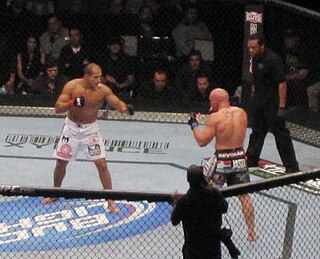
Mixed martial arts (MMA) is a full-contact combat sport based on striking, grappling and ground fighting, incorporating techniques from various combat sports from around the world. The first documented use of the term mixed martial arts was in a review of UFC 1 by television critic Howard Rosenberg in 1993.
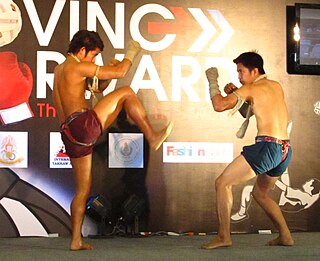
Muay Boran or originally Toi Muay is an umbrella term for the ancient unarmed martial arts of Thailand prior to the introduction of modern equipment and rules in the 1930s.
Welterweight is a weight class in combat sports. Originally the term welterweight was used only in boxing, but other combat sports like muay Thai, taekwondo, and mixed martial arts also use it for their own weight division system to classify the opponents. If used, welterweight is typically between lightweight and middleweight.

Shadowboxing is a combat sport exercise in which a person throws punches at the air as though there is an opponent. Practised primarily in boxing, it is used mainly to prepare the muscles before the person training engages in stronger physical activity. Muhammad Ali once performed a now famous shadowboxing routine next to Howard Cosell for ABC's Wide World of Sports television cameras. Black Nova Scotian boxer George Dixon is widely credited for developing the technique.
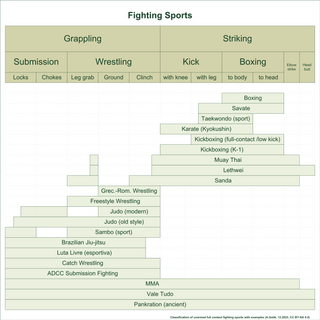
A combat sport, or fighting sport, is a contact sport that usually involves one-on-one combat. In many combat sports, a contestant wins by scoring more points than the opponent, submitting the opponent with a hold, disabling the opponent, or attacking the opponent in a specific or designated technique. Combat sports share a long history with the martial arts.

Fight Network is a Canadian English language Category B specialty channel owned by Anthem Sports & Entertainment. The network broadcasts programming related to combat sports, including mixed martial arts, boxing, kickboxing, and professional wrestling.

A superman punch is a technique used in Sanda, Lethwei, Muay Thai, ITF-style Taekwondo, kickboxing, mixed martial arts fighting and professional wrestling. The technique involves bringing the rear leg forward to feign a kick, then snapping the leg back while throwing a cross, resulting in greater power behind the punch.
The World Kickboxing Network (WKN) is an international Kickboxing governing body established in 1994.
Mixed martial arts (MMA) has developed in Australia from a wide cross-section of sporting and martial arts disciplines to become the most popular combat sport in the country.

Michelle Preston is a Muay Thai Fighter and professional boxer. Preston resides in Auckland, New Zealand, where she has fought most of her professional fights. Preston has held many titles including New Zealand National Title, WBA Regional title and WBO Regional title. Preston is also a World title contender, fighting for the IBF World super flyweight title against Argentinian World Champion Débora Anahi Dionicius. Preston is also a Five time World Kickboxing Champion. Preston has fought on four King in the Ring undercards. Preston won her last World title on 17 November 2017 on the Main Undercard of King in the Ring. Preston won the vacant WBC Muaythai World Super Flyweight Champion against Fani Peloumpi by Majority decision.
Professional boxing in New Zealand refers to the sport of boxing held in New Zealand at a professional level.
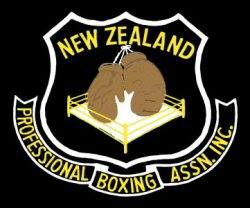
New Zealand Professional Boxing Association (NZPBA) is one of the four governing bodies for the sport of professional boxing in New Zealand. NZPBA is a non-profit organisation.
Genah Fabian is a New Zealand kickboxer and mixed martial artist.

Geovana De Cassia Peres is a Brazilian-born New Zealand professional Muay Thai fighter and former professional boxer who competed from 2017 to 2019. She became the first female light-heavyweight world champion, having held the WBO female title from 2019 until her retirement in January 2021.
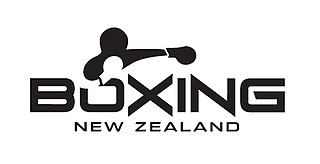
Boxing NZ inc is New Zealand's leading amateur boxing organisation that was established in 1924.















